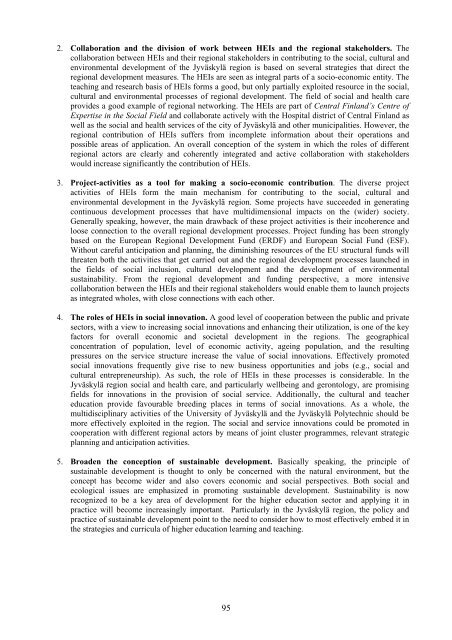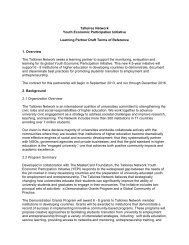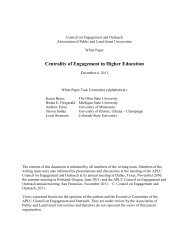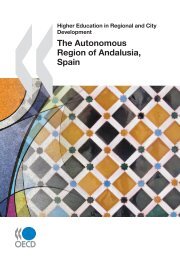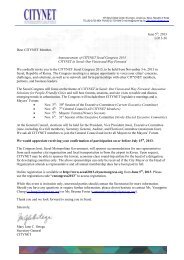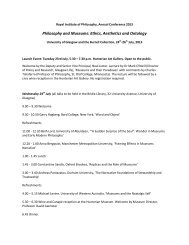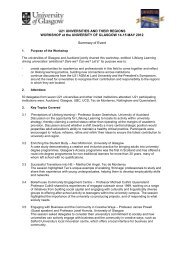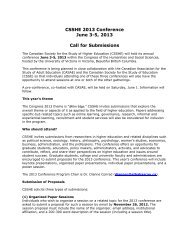Finland - Jyvaskyla Region - Final Self-Evaluation Report.pdf
Finland - Jyvaskyla Region - Final Self-Evaluation Report.pdf
Finland - Jyvaskyla Region - Final Self-Evaluation Report.pdf
Create successful ePaper yourself
Turn your PDF publications into a flip-book with our unique Google optimized e-Paper software.
2. Collaboration and the division of work between HEIs and the regional stakeholders. Thecollaboration between HEIs and their regional stakeholders in contributing to the social, cultural andenvironmental development of the Jyväskylä region is based on several strategies that direct theregional development measures. The HEIs are seen as integral parts of a socio-economic entity. Theteaching and research basis of HEIs forms a good, but only partially exploited resource in the social,cultural and environmental processes of regional development. The field of social and health careprovides a good example of regional networking. The HEIs are part of Central <strong>Finland</strong>’s Centre ofExpertise in the Social Field and collaborate actively with the Hospital district of Central <strong>Finland</strong> aswell as the social and health services of the city of Jyväskylä and other municipalities. However, theregional contribution of HEIs suffers from incomplete information about their operations andpossible areas of application. An overall conception of the system in which the roles of differentregional actors are clearly and coherently integrated and active collaboration with stakeholderswould increase significantly the contribution of HEIs.3. Project-activities as a tool for making a socio-economic contribution. The diverse projectactivities of HEIs form the main mechanism for contributing to the social, cultural andenvironmental development in the Jyväskylä region. Some projects have succeeded in generatingcontinuous development processes that have multidimensional impacts on the (wider) society.Generally speaking, however, the main drawback of these project activities is their incoherence andloose connection to the overall regional development processes. Project funding has been stronglybased on the European <strong>Region</strong>al Development Fund (ERDF) and European Social Fund (ESF).Without careful anticipation and planning, the diminishing resources of the EU structural funds willthreaten both the activities that get carried out and the regional development processes launched inthe fields of social inclusion, cultural development and the development of environmentalsustainability. From the regional development and funding perspective, a more intensivecollaboration between the HEIs and their regional stakeholders would enable them to launch projectsas integrated wholes, with close connections with each other.4. The roles of HEIs in social innovation. A good level of cooperation between the public and privatesectors, with a view to increasing social innovations and enhancing their utilization, is one of the keyfactors for overall economic and societal development in the regions. The geographicalconcentration of population, level of economic activity, ageing population, and the resultingpressures on the service structure increase the value of social innovations. Effectively promotedsocial innovations frequently give rise to new business opportunities and jobs (e.g., social andcultural entrepreneurship). As such, the role of HEIs in these processes is considerable. In theJyväskylä region social and health care, and particularly wellbeing and gerontology, are promisingfields for innovations in the provision of social service. Additionally, the cultural and teachereducation provide favourable breeding places in terms of social innovations. As a whole, themultidisciplinary activities of the University of Jyväskylä and the Jyväskylä Polytechnic should bemore effectively exploited in the region. The social and service innovations could be promoted incooperation with different regional actors by means of joint cluster programmes, relevant strategicplanning and anticipation activities.5. Broaden the conception of sustainable development. Basically speaking, the principle ofsustainable development is thought to only be concerned with the natural environment, but theconcept has become wider and also covers economic and social perspectives. Both social andecological issues are emphasized in promoting sustainable development. Sustainability is nowrecognized to be a key area of development for the higher education sector and applying it inpractice will become increasingly important. Particularly in the Jyväskylä region, the policy andpractice of sustainable development point to the need to consider how to most effectively embed it inthe strategies and curricula of higher education learning and teaching.95


